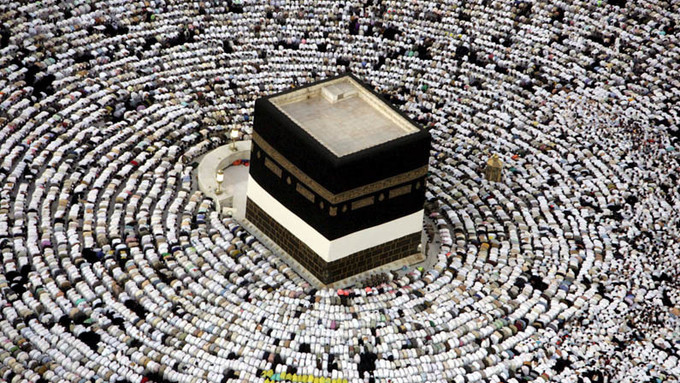5 Steps To Get You Ready for Ramadan
Once the smoke of July 4th fireworks and grills wafts away it will probably dawn on you that Ramadan is less than a week away. Anxiety about the long hours of fasting and the heat sets in. Long gone is the winter Ramadans of your youth, where you would come home from school and nap for an hour before you broke your fast with Mama’s homemade basbousa. Times have changed, and it will become clearer in a month. How do we avoid this eventuality? We have to adapt, and that takes preparation. The Prophet (Peace & Blessings upon Him & His Family) supplicated,” O Allah give us the blessings of Shaban and give us the treasure of Ramadan”. Most of us may feel disheartened that the “treasure” will have to wait till 9pm daily, but there are 5 things we can do now during the end of Rajab and blessings of Shaban to make sure that we get the most out of Ramadan:
1. Reduce Your Food Consumption
"Eat of the good things we have provided for your sustenance, but commit not excess therein." (Qur'an 20:81). Lessening our caloric intake (Qilatul Ta’am) keeps us healthy, sharpens our memory, reduces hours of sleep, helps smooth breathing and saves one from being sluggish. There is a beautiful Prophetic practice of eating what is in front of you, chewing slowly, and not piling the plate. “Eat and drink, but be not extravagantly wasteful. Lo! He loveth not the extravagantly wasteful." (Quran 7:31). Beautiful cultural traditions aside, strive to eat more natural and simple foods to engender better eating habits throughout the year. We each have our own unique recommended daily intake (RDI) based on our individuated lifestyles. Small steps towards lowering caloric intake include meal planning and tracking what you eat. Keep in mind these Prophetic tips to control your portion size,
i. “Nothing is worse than a person who fills his stomach…
ii. “1/3 food, 1/3 liquids, and 1/3 for his breath”.
iii. Get in the habit today of not skipping breakfast (“Take suhoor because there is blessing in it")
iv. Eat dinner early (“The people will be fine so long as they do not delay iftaar”)
v. No snacking afterwards.
2. Jittery? Start Cutting out the Caffeine
If you are a caffeine junkie (like 90% of us), you probably spend the first three days of Ramadan suffering from caffeine withdrawal. The migraines can be excruciating. To avoid this pitfall, start by slowly reducing your caffeine intake. If coffee is your bane, consider ordering/making a half-cafe blend (50% Decaf mixed with 50% Caffeinated), switching to decaf (2-12 mg), or Green Tea (24-40mg). Week over week, reduce intake, or switch to a lesser evil until upon the arrival of the blessed month you have nearly weaned yourself off. This will make those first few days easier.
3. Dust off your Quran
Do you ever get to Ramadan, only to realize your IKEA bookcase could really use a dusting? This is the month of the Quran (2:184). Year over year we tell ourselves, “I will learn how to recite, memorize, implement ET all”, and yet we arrive to the next Ramadan the same as we left that last one. The Messenger Muhammad (peace be upon him and his family) loved to read the Qur’an. In fact, it was his primary form of worship during Ramadan. Most Muslims rarely interact with the Qur’an outside of their five daily prayers. Take this time to brush up, getting out of the routine of recycling the same surahs in prayer, or simply pick up this fascinating book and start reading it in the language you understand best.
4. Unplug Yourself: Use your DVR & Give Facebook a Rest
“Status Update: Hungry”. Ramadan is a month of reflection and habit changing, look at it as a spiritual diet. You have 30 days to cut out all that noise around you and concentrate on your relationship with Allah and His Messenger. Attempt to minimize social media and television. You can watch/follow/status update after Ramadan. Doing so will give you ample time to talk to connect to The Real, letting go of the virtual. If TV/ Media time is eating into your social time, or your prayer time, something has gone seriously awry. Keeping a healthy balance is the key to a happy, spiritually fulfilling life.
5. Practice the Art of Silence
Aisha (May God be Pleased) was once told about some people that talk a lot. Her response was “Tell them to give their angels a rest”. Mental and audible chatter prevents us from fully being present within our work, relationships, lives, and worship. Lessening speech (Qilatul Lisan), and actually listening to our thoughts, insecurities, fears, will consciously withdraw our attention from the temporal to the eternal while reacquainting us with your true selves. The Messenger of Allah (Peace & Blessings upon Him & His Family) said, “The intelligent person is the one who examines himself and works for what will come after death”. By listening we can start to work on governing our minds and emotions positively, eventually quieting our mental chatter. “If you believe in God and the Final Day have positive speech, or keep quiet”. This practice of self examination (Muraqaba) allows us a window into our reality and the ability to observe and learn about ourselves so as to exist in balance with our surroundings. Check out this great book on the power of keeping silent by Susan Cain.
With God’s grace, we can prepare now in the blessing of Shaban, to enrich our lives in the “treasures” of Ramadan. As Zayn Al Abideen prayed, “Praise belongs to Allah who appointed among the paths that lead to Him (Exalted Is He) His month, The month of Ramadan, The month of fasting, The month of submission, The month of purity, The month of putting our faith to the test, The month of standing in prayer, “In which the Qur'an was sent down as guidance to the people, And as a clear sign of the Guidance and the Criterion!” [2:185]”.
-Ameen-
Faith & Spirituality Related Articles

5 Practical Steps To Get You Ready for Ramadan
As Ramadan is less than a month away, we might feel we often haven't done enough to prepare for it. Here are 5 things we can do right now during Shaban to make sure that we get the most out of Ramadan. The Prophet (Peace & Blessings upon Him & His Family) supplicated,” O Allah give us the blessings of Shaban and give us the treasure of Ramadan.”

Hajj at Home: Kindling the Spirit of Arafah
Even if we are not on Hajj this year, our situation is no different. We navigate through the complexities of our daily life, immersed in the never-ending responsibilities of work and family, inundated with the intrusions of technology and social media into every minute of our lives, moving from place to place and idea to idea.
